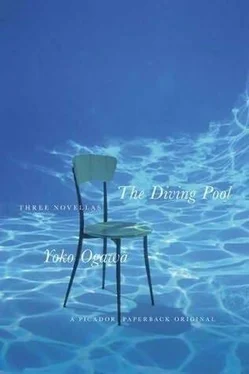Just then, we heard the sound of slippers along the corridor, and Naoki ran into the room.
"Hi, Jun! Could you do a handstand?" He danced around Jun like an excited puppy. He was three years old and suffered from asthma, which left his voice hoarse.
"Okay, but not right now," Jun said, rising from the couch and catching Naoki in his arms. The children at the Light House loved Jun, perhaps because he was extraordinarily good to them. They loved him just as I loved him, and everyone seemed to want to touch him. As he headed off, Naoki still in his arms, I whispered that he should take care of his wrist.
"Then when?" Naoki whined. "And you have to walk on your hands, too." The rough sound of his voice disappeared down the hall.
To my mind, dinner was the strangest part of life at the Light House-beginning with the fact that the kitchen and the dining room are in the basement.
The church and the Light House are old, Western-style wooden buildings, their age apparent in every floorboard, hinge, and tile. The structures have become quite complex through frequent additions, and from the outside it is impossible to grasp their layout. Inside, they are more confusing still, with long, winding halls and small flights of stairs.
The foyer of the Light House leads to a maze of corridors that snake through the building and eventually to a hall on the second floor that looks down on the courtyard through a window. At the end of the hall, there is a trapdoor in the floor with a heavy iron handle. The door makes a dry creak when it's lifted. We would fasten it to a hook on the ceiling before going down the steep flight of stairs to the dining room and the kitchen.
The children loved the secret staircase. Before every meal there was a race-often ending in a fight-to see who could get to the trapdoor first. The director or one of the teachers hurried the children along as they disappeared down the staircase, one after the other.
When I pulled on the rusty handle, heard the creaking of the trapdoor, and smelled the odors of the kitchen coming up the stairs, I was often reminded of The Diary of Anne Frank: the stairs hidden behind the revolving bookcase, the plan of the secret house as convoluted as that of the Light House, the yellow Star of David, the pins in the map tracking the advancing invasion of Normandy, the gloomy, inadequate meals with Peter, the van Daans, and Dr. Dussel. Like Anne, I could feel my appetite diminish with each step I took down the secret stairs of the Light House.
Though the kitchen and dining room are partially underground, they were neither dark nor damp. There are a number of large windows overlooking the garden to the south, and from the windows to the north, light filters in through the woods.
Yet here, too, there were inescapable signs of age and decay. The frying pans and pots lined up on the drying rack were scorched and discolored, and the appliances- mixers, ovens, refrigerators, and the like-were sturdy but old. The surface of the enormous table that dominated the room was covered with scratches and, in places, hollowed out by deep gouges.
I found breakfasts in this dining room almost unbearable, amid a crowd of noisy children and scraps of scattered food. At dinnertime, my father, who went to bed early in order to be up for morning services, would eat with the dozen or so younger children; and afterward I would eat with Jun, Reiko, who was in the third year of middle school, the night proctor, and my mother. But even among the adults, after the tables had been wiped of the children's spills, I still found the meals disgusting.
My mother was the heartiest, most cheerful person at the Light House. Particularly talkative during dinner, she was not one to cast about for topics that would include everyone, preferring to talk about herself and her interests from the moment we sat down until the meal was over. As she would grow increasingly excited and out of breath, I often wondered whether she in fact hated herself for talking so much.
Eventually I began worrying that Jun and the others were growing weary of her. Her lips were like two maggots that never stopped wriggling, and I found myself wanting to squash them between my fingers. It was pitch black outside and the glass in the windows had turned a deep shade of green, but her voice tumbled brightly on in the darkening world. Reiko and the night proctor stared down at their plates and mumbled acknowledgments from time to time.
Jun's hair was dry by then. His body seemed smaller and more vulnerable when it wasn't wet. Unlike the rest of us, he never looked bored or sighed when my mother talked too much. Instead, he listened intently to her overbearing voice, nodding politely, eating with gusto, and even breaking in from time to time to ask a strategic question that encouraged her to talk even more. His voice seemed to blend with hers, and she turned to face him as her babbling grew more and more frantic.
Meanwhile, I sat studying his profile, wondering how he could be so kind while I felt nothing but the cruelest sort of disgust. He would come down from the diving board and return to the Light House, where his muscles would warm and soften like silk floss, and then he would soak up all the things that set my nerves on edge-Naoki's raspy voice, the scraps of food flung about by the children, my mother's endless chattering. It seemed strange that he could be so good when life had treated him so badly: a father who ran off when he was born and a mother who had abandoned him for the bottle. I prayed desperately to be bathed in his kindness.
The sound of children's feet came through the floor from upstairs. It was bath time: I could imagine them running around in great clouds of talcum powder. I stared at my mother's glistening lips and nudged my chopsticks against the fatty bits of meat left on my plate. Then I passed a sauce bottle to Jun, hoping to hear him say "Thank you"-the sound of his voice could wash away the sour feeling in my stomach.
It was a quiet Sunday afternoon. My mother and father had gone out to record a radio program for the church. Reiko, who shared my room, was stretched out on the top bunk reading a science magazine. Jun was at the ballet class he attended every week. He had started recently at the urging of his diving coach, who said it would help him with form and flexibility. I have trouble imagining him at ballet class, accustomed as I am to seeing his body framed in sparkling water at diving practice, but I found myself feeling jealous of those flat-chested little girls in white leotards, their hair pulled back in tight buns.
In Jun's absence, these Sunday afternoons seemed somber and endless. I kept busy by reviewing for my English class; when I became bored, I flipped through the dictionary at random, studying the simple yet strangely realistic illustrations: an albatross, a still, a wood box, a waffle iron.
It was a beautiful day outside. Sunlight covered the ground like a shower of gold dust. The shadows of trembling ginkgo leaves were etched sharply on the wall of the church, and the breeze blowing through the curtains carried the first hints of summer.
"Are you going to the hospital today?" I said, turning toward Reiko.
"No, not today," she replied without looking up from her magazine.
Reiko had come to the Light House less than six months earlier. My parents had carried in boxes stuffed with books and tired, out-of-fashion clothes, and then Reiko herself had appeared at the door of my room. She was heavyset and taller than I was, and she wore thick glasses. Though she was only in middle school, her flesh seemed to sag in places, like the body of a middle-aged woman.
"Pleased to meet you," she said, lumbering into the room as if her body were a burden.
It was rare for someone as old as Reiko to come to the Light House. Most children were brought as infants and were adopted while they were still young. Jun was the first to reach high school age while still living here.
Читать дальше












